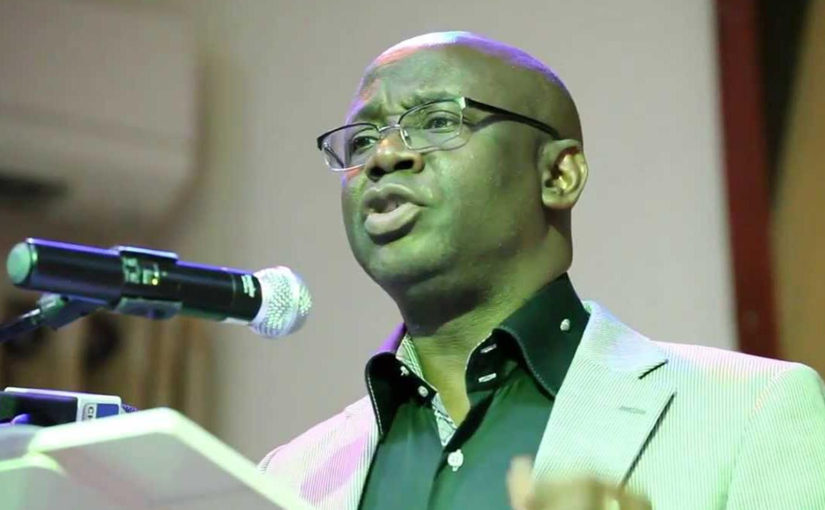The Serving Overseer and Senior Pastor of The Latter Rain Assembly, Tunde Bakare, has asked Christians in Nigeria to actively engage in the country’s political process ahead of the 2019 general elections and beyond, instead of maintaining a passive posture in governance matters.
Pastor Bakare gave this charge while addressing a gathering of church leaders and other participants at a political summit in Lagos organized by the umbrella body of Pentecostals in the country, the Pentecostal Fellowship of Nigeria.
Speaking on the topic, “Christian Agenda Towards 2019: Mobilising The Church”, the convener of the Save Nigeria Group, said Christians cannot afford to mobilise for 2019 elections from a position of ignorance but of full knowledge of the Church’s mandate in the nation. Therefore, the Christian Agenda for 2019, he said, must go beyond asking believers to register and get their Permanent Voter Cards (PVCs).
“I will begin by asking you two very important questions: Who are we mobilising, and for what exactly are we mobilising them?”
For Pastor Bakare, merely voting in the final elections to choose leaders is not enough to produce the desired good governance in Nigeria. He challenged Christians to fully participate in political party activities and be part of the processes that throw up candidates for the various positions, from the ward to the national levels.
“Therefore, if the Church has not been active in the major political parties, and if we are going to be forced to choose between undesirable candidates while the other political parties and candidates stand little or no chance, what then are we mobilising for?”
The outspoken pastor also sought to explain the Church’s passiveness in matters of national governance. “It appears to me that at the root of this dilemma is the fact that the Church has not yet comprehended the nature of its assignment to the nation. Look through history and examine the involvement of the Nigerian Church in political activities; it appears that the Church has been motivated not by a compelling need to salvage a dying nation in line with our God-given mandate but by fear of marginalisation by non-Christians.
“We seem to be propelled not so much by the need to establish good governance in the land but by the quest to balance the equation and to quell a perceived Islamic agenda with a so-called Christian agenda.”
According to Pastor Bakare, rather than adopt a reactionary position, Nigerian Christians should be proactive and engage the system, not essentially for self-preservation but for national development.
“If we complain against an Islamic agenda, is it then fair to call for a Christian agenda?” he asked, adding, “I announce to you that in God’s plan for Nigeria, there is no Christian agenda, there is no Islamic agenda, and there is no ethnic agenda. There is only the Kingdom Agenda: namely, the emergence of the New Nigeria, a nation under God … where no one is oppressed, where all people will be free to walk, each in the name of their god, but we will walk in the name of the Lord our God.
He continued, “In this Kingdom Agenda, the role of the Church is to be proactive, not reactionary or defensive. Ahead of 2019 and beyond, the Church must maintain this apostolic position in relation to the nation.”
However, Pastor Bakare did not mince words in spelling out the requirements of the Church that has the capacity to drive the nation-building agenda.
He lampooned the current state of the Church in Nigeria, saying it has attracted disdain to the body of Christ, instead of awe from the government and the unbelieving public.
Citing an example, Pastor Bakare said, “Disdain for the Church became particularly pronounced when a former Head of State, who the Church prayed into power against prophetic warnings, reportedly said that he looked around him thinking he was surrounded by men of God, only to realise that he was surrounded by contractors.
“Then the Church and its leaders, devoid of power and relying on extra-scriptural devices to attract a gullible audience, became fodder for comedy. Comic content soon gave way to insults and diatribes. From corruption allegations to sex scandals, the Church has continued to suffer humiliating disrespect. In more recent times, insults have been hauled on the Church by anti-tithe crusaders who lack the moral authority but continue to take advantage of the excesses in the church to raise their storm in a teacup.”
For Bakare, therefore, for the Church to provide leadership for the nation, she must stand on moral high ground and be the salt of the earth, the role she has been divinely designated to play. Only then can she galvanise her army of nation-builders to restore a broken and dying nation, as was the case in the land of Israel where notable men and women emerged at various times to chart paths for their nation’s progress and prosperity.
He challenged the Church in Nigeria to “inspire the nation to raise the bar of governance expectations (and)… become proactive in mobilising an army of nation builders” which, he maintained, amounts to heeding “the cry of millions of Nigerians crumbling under the weight of oppressive systems and structures.”


